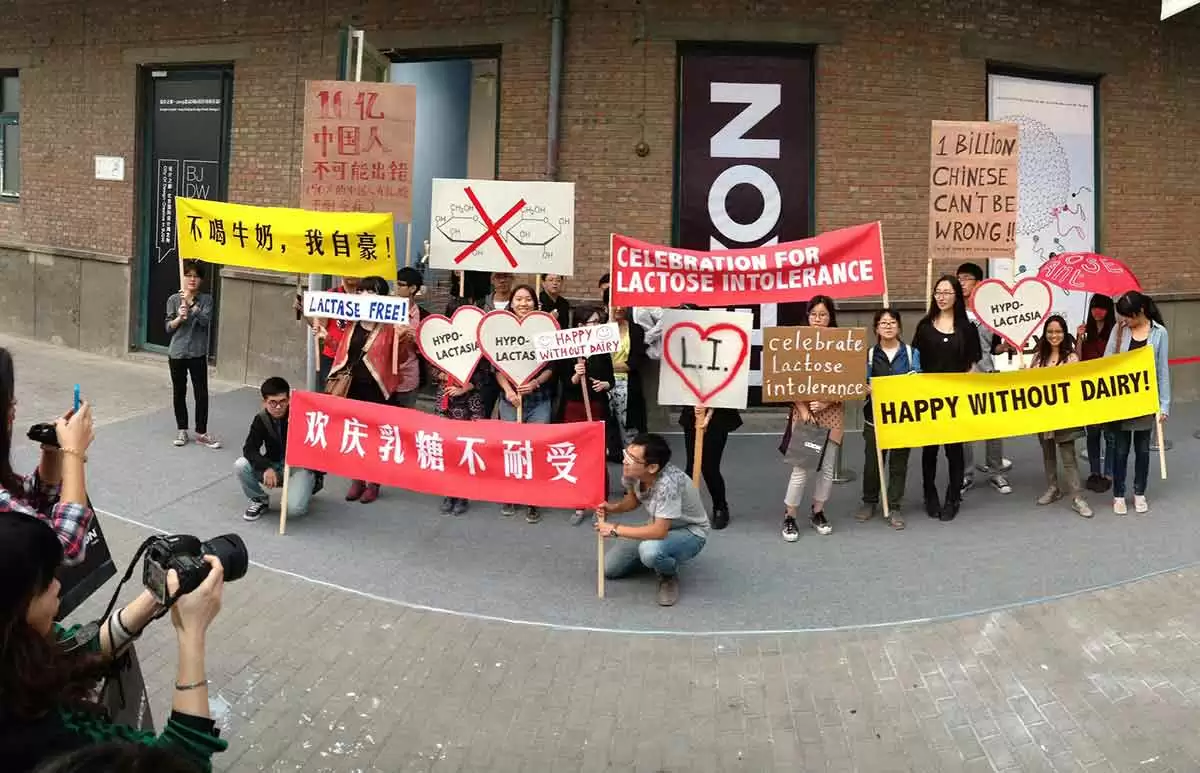
Celiac.com 04/30/2021 - According to Dangerous Grains by Dr. Ron Hoggan and James Braly, M.D., intolerances to foods other than gluten are the most common reason that people continue to have health problems after they've gone on a gluten-free diet. Yet, from the hundreds of emails I've gotten from people on the celiac email list, and from online forums, I've found that many people don't investigate other food intolerances, even though they suffer from health problems that likely could be cured by eliminating problem foods.
I was sick for five months solid in the summer of 2004, after I'd adopted a gluten-free diet. I would get up in the morning feeling half well; I'd get my shopping done first thing in the morning. Then I'd go home and lapse into a semi-stuporous state. I would sit in a chair for the rest of the day, my mind slogging slowly through a swamp. I thought at the time it was hayfever from my 53 inhalant allergies, but I was taking six different allergy medicines, to no avail.
Celiac.com Sponsor (A12):
I later found that I actually had intolerances to about 90% of the foods I'd been eating. What had really been happening, it seemed, was that I felt somewhat better after fasting overnight. Then I would eat something an allergen for breakfast. I'd get my shopping done then I'd start to feel sick from my breakfast. My inhalant allergies were actually only a small part of the problem. After going on an exotic foods diet, I became much healthier. In the summer of 2005, I went running every day and my mind was much clearer. My 53 inhaled allergies no longer bothered me as much.
This is typical for people with multiple food intolerances. They can be hidden just like gluten intolerance. If you're like me, your body probably didn't like gluten long before you were aware of it. It's not like a peanut allergy. If you were allergic to peanuts, you'd probably know it. Your body isn't able to suppress that allergic reaction. But if you're gluten intolerant, you can eat gluten every day and never know what's making you so sick. Your body hides its reaction, so you don't notice feeling worse after eating gluten. Wheat might even have been one of your favorite foods.
After you stop eating gluten, your body no longer has to work so hard to suppress food intolerance reactions. So if you have other food intolerances, after a few months or so you may start to feel obviously worse after eating those foods. This is an excellent reason for sticking strictly to a gluten-free diet - it will help you find any other food intolerances you may have, and thus speed your recovery. If you don't do a careful elimination diet, you may be in for a long, agonizing process of eliminating the foods you're intolerant to, one by one, feeling sick perhaps for years after starting a gluten-free diet.
Food intolerance can cause many other problems. Joint pain and stiffness is a common symptom. Just before I found out about my gluten intolerance, both my elbows and knees were hurting, and the tendons in my forearm and hand hurt so much I couldn't lift a cast iron pan with one hand. After I eliminated the many foods I'm intolerant to, in addition to gluten, I was able to run without pain. I've also noticed that my old joint injuries often stiffen after food challenges. Joint inflammation and stiffening are thought to accelerate joint destruction in osteoarthritis, the wear-and-tear arthritis that many people suffer from as they get older.
Many diseases are partly caused by chronic inflammation. Inflammation contributes to the onset and progression of tumors, and is involved in atherosclerosis. Hidden food intolerances can cause chronic inflammation and irritation in many areas of the body, so finding your food intolerances could help with any problem that involves irritation or inflammation. I think that when food intolerances are hidden, the body compensates somewhat for their pro-inflammatory effects, because my C-reactive protein and sedimentation rate, measures of inflammation, were high at a time when my food intolerances were in the process of being unmasked - but my C-reactive protein was actually lower than normal when I was still eating tiny amounts of some foods that I later found I had hidden intolerances to. However, the body doesn't seem to be able to compensate completely for the pro-inflammatory effects of food intolerances.
A gluten-containing diet raises the risk of some GI tract cancers in celiacs. Perhaps other food intolerances also cause GI tract cancer - a scary possibility!
I had a hard time with carbohydrates for more than twenty years. When I tried highly glycemic carbs, I would feel jittery, hungry, irritable, and tense. My carbohydrate reactions went away after I found my non-gluten food intolerances. I can eat almost any amount of tapioca starch mixed with maple syrup - an enjoyable, sticky goo with a very high glycemic index - and all that happens is that I get high and happy and I feel like going out and exercising. My jittery, anxious food reactions weren't simply reactions of intolerance. For example, I have intolerances to many low-carb foods, like peanuts. A tiny trace of peanut oil made me sick for days, but peanuts had never made me feel jittery or anxious when I ate them before I found my hidden food intolerances. Rather, it seems that having hidden food intolerances caused my body to release a lot of adrenaline after I ate carbohydrates, or else it made my body more sensitive to adrenaline. A study of people with suspected reactive hypoglycemia showed that they were hypersensitive to adrenaline.
If you have emotional or psychiatric problems, it's also worth looking for hidden food intolerances, although according to Brostoff and Gamlin's book Food Allergies and Food Intolerance, people who have psychological problems from food intolerance usually have physical health problems as well.
Some other problems that are possibly related to food intolerance are asthma, fatigue, rashes, irritable bowel syndrome, migraines, sinusitis, recurring urinary tract infections, and light and/or noise sensitivity.
If you have food reactions that you might attribute to accidentally being exposed to gluten, but you can't verify that you actually had gluten, you might actually be reacting to other foods.
The gold standard for finding food intolerances is to do an elimination diet for a week or two and then to try foods one by one, and see if they have some kind of bad effect. If you think you have a food reaction that's delayed for days, it would be a good idea to try the food again to see if the same reaction happens again. Here's another caution: once or twice, I've thought I'd reacted to a food challenge, when actually I had a bladder infection.
If you do the elimination diet perfectly, you can probably find all of your food intolerances at once, which would save many people from many years of sickness. However, this is very difficult, because doing an elimination diet correctly means eliminating all common food allergens – that is, all foods that you normally eat fairly often, as well as all foods that might cross-react with those foods. Brostoff and Gamlin's book has a lot of information on food intolerance cross-reactions that very accurately reflects my experience. Ideally, you should also quit taking any medications or supplements that you normally take, or get your medications made by a compounding pharmacy without fillers, because most medications have many allergenic non-medical ingredients such as corn starch. Even your toothpaste could be causing a reaction. After I found my intolerance to birch, I kept on using toothpaste that was sweetened with birch xylitol, washing my mouth carefully with water after brushing my teeth. Once, though, I forgot to wash my mouth out, so a little toothpaste went down my throat, and I got sick for four days. You can brush your teeth with baking soda, which you won't have an intolerance to, since it's not made from anything organic.
It's also very difficult to do an elimination diet because people are often addicted to foods they're intolerant to. On one elimination diet I did, I was unable to stop using fructose made from corn. Later, I painfully, slowly, quit using fructose over many months. When I finally eliminated all corn products from my diet, I found that my body had been masking about 30 or 50 other food intolerances, as a side effect of masking my corn intolerance. After I eliminated corn, I suddenly started getting sick after eating many of the foods I'd been eating all along.
Elimination diets and food challenges can be done in an in-patient setting, which might be the only way to completely adhere to the diet. If you have an IgE mediated food allergy, food challenges should only be done with medical supervision. Brostoff and Gamlin's book has a number of elimination diets of varying degrees of strictness.
Some people rely instead on IgG ELISA blood testing for food intolerances. The idea behind the test is that a higher than normal level of IgG antibodies to a food might mean that one has intolerance to it. The body normally makes IgG antibodies to foods. One research study showed that many people with irritable bowel syndrome were helped by eliminating foods based on IgG ELISA testing, but otherwise the tests haven't been validated by research. Researchers have also tried sending several blood samples obtained from the same person at the same time to different labs, or more than one blood sample to the same lab, and found the test results were very inconsistent.
Finding your hidden food intolerances is often a long, painful process that is full of errors and guesses. It's also very important to do if you are not completely healthy on a gluten free diet.








Recommended Comments
There are no comments to display.
Create an account or sign in to comment
You need to be a member in order to leave a comment
Create an account
Sign up for a new account in our community. It's easy!
Register a new accountSign in
Already have an account? Sign in here.
Sign In Now